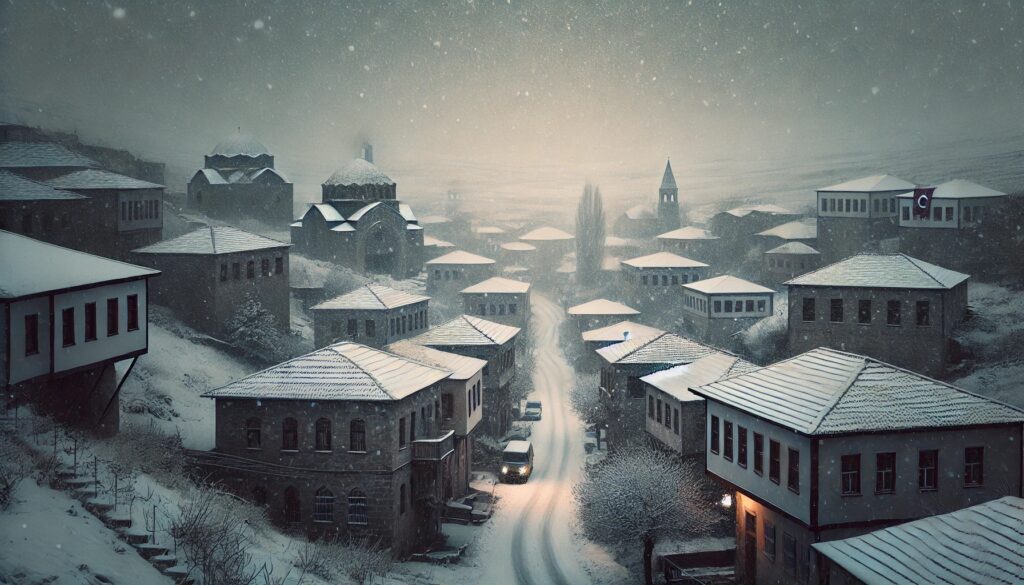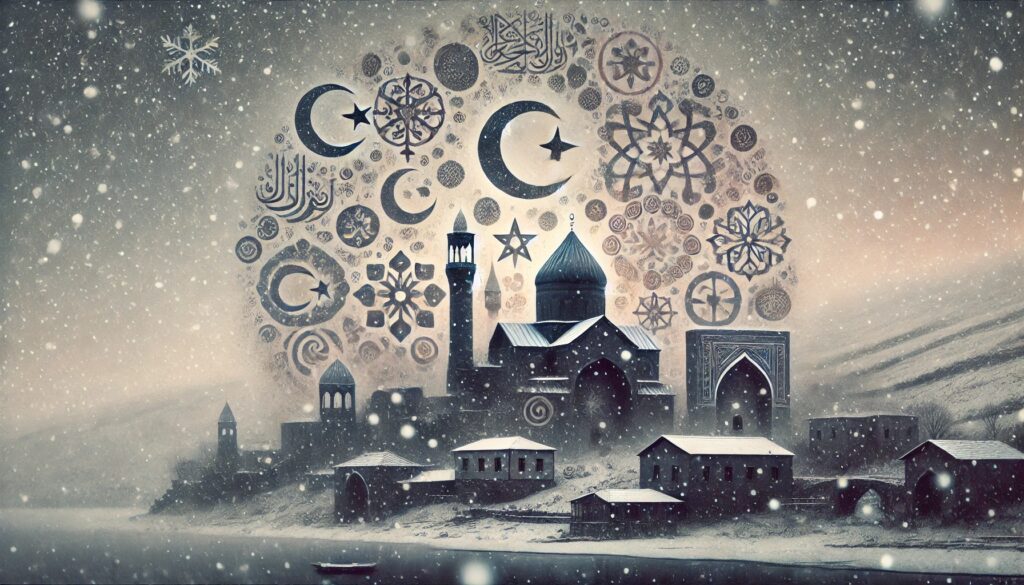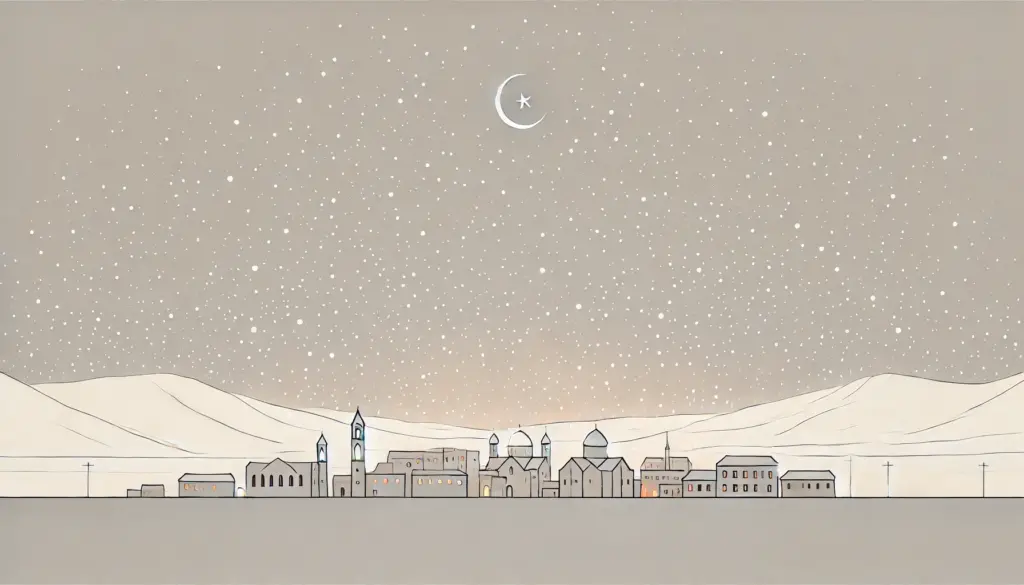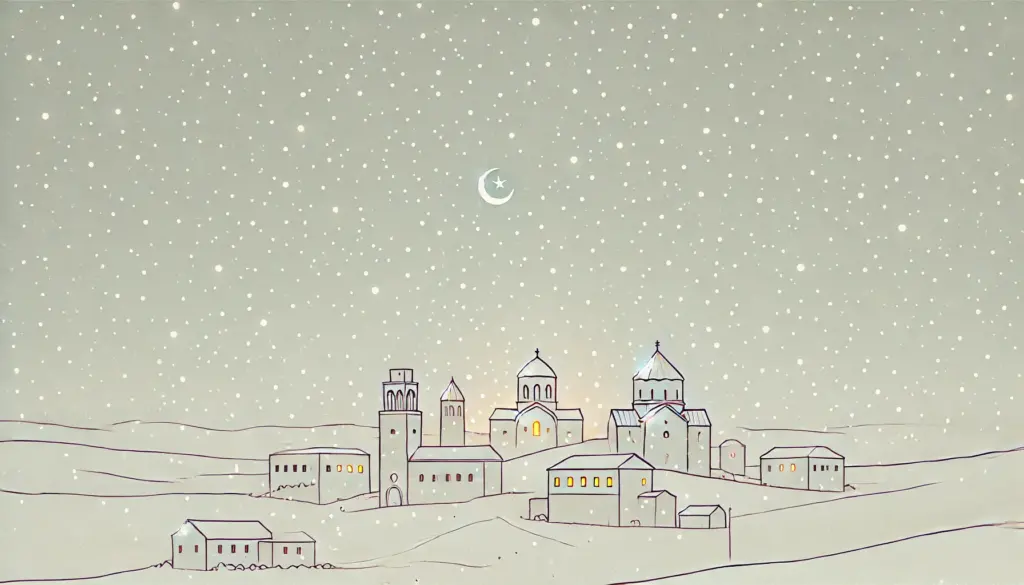
ChatGPT:
Snow by Orhan Pamuk (Expanded Summary)
🌨️ Setting and Premise
Snow opens with the return of Ka, a Turkish poet living in exile in Germany, to the remote town of Kars. The town, locked in by snowfall, symbolizes both a physical and ideological isolation. Ka’s mission in Kars is twofold: officially, he’s there to investigate the suicides of several young women who reportedly took their lives over the tension of being pressured to remove their veils; personally, he’s also there to reconnect with Ipek, a woman he once loved. This dual mission sets the stage for Ka’s personal and philosophical exploration as he becomes enmeshed in the town’s conflicts.
🌌 Kars as a Microcosm of Turkey
Kars, an impoverished town on Turkey’s border, becomes Pamuk’s symbol for Turkey’s internal divides. The region’s diverse influences—Turkish, Russian, Armenian, and Kurdish—highlight the ethnic and cultural tension that mirrors Turkey’s national identity crisis. The people of Kars navigate a mix of traditional values, secular aspirations, and Islamist conservatism. As Ka learns more about the town’s atmosphere, he discovers a place deeply fractured along political and religious lines, and this division underscores every character’s motives.
❤️ Ka and Ipek’s Love Story
Central to Ka’s journey is his rekindled love for Ipek, the beautiful daughter of a hotel owner in Kars. Their romance represents Ka’s yearning for belonging, happiness, and stability—things he feels he has lost in his years abroad. However, their relationship is fraught with complexities. Ipek, recently separated from her politically engaged husband, Muhtar, is herself a figure of compromise and divided loyalties. Ka’s pursuit of Ipek reveals both his deep longing for connection and the obstacles created by his own conflicted identity.
📝 Poetry as Ka’s Reflection
Snowfall in Kars inspires Ka to write poetry, something he had not done for years in exile. Each snowflake and poem serves as a symbol of Ka’s inner self and his attempts to reconcile with his identity. The poems themselves seem to “appear” to him in moments of revelation, as though coming from a mystical or spiritual source. Through poetry, Ka processes the beauty and despair of his surroundings, creating a personal tapestry that parallels his struggles with faith, love, and the meaning of existence.
⚔️ Ideological Battle: Secularism vs. Islamism
Through characters like Sunay Zaim, a secularist actor, and Blue, a fervent Islamist, Pamuk creates a world of clashing ideologies. Sunay’s role is particularly provocative; he stages a play that mocks Islamic customs, intending to expose the extremism he sees as a threat to Turkish society. This act incites violence, blurring the line between theater and real life. On the other side, Blue represents the allure and power of Islamist ideology, embodying the growing dissatisfaction with Western values among some Turks. Ka is caught between these perspectives, challenged by both Sunay’s secular ambition and Blue’s spiritual conviction.
👤 Ka’s Identity Crisis
Ka’s inner conflict is emblematic of the novel’s larger themes. Raised in Turkey but shaped by his time in Europe, Ka represents a “split” Turkish identity, both intrigued and repelled by the forces shaping Kars. He struggles with his belief in God, fluctuating between atheism and faith. His crisis of identity deepens as he interacts with locals who each have unique relationships with Turkish nationalism, Islam, and secularism. Ka’s attempts to belong and understand Turkey’s political divides reveal his estrangement from both his homeland and himself.
💔 The Young Women’s Suicides
The suicides Ka investigates serve as a grim reflection of the forces at play in Kars. The girls, who chose death over the pressure to abandon their veils, symbolize the human cost of ideological wars. They are caught between a secular society pushing for modern values and a traditional culture that holds its own oppressive expectations. Through Ka’s inquiries, Pamuk explores the psychological burden these girls face, showing how the control over women’s bodies and identities becomes a battleground for power.
🧠 Faith as Both Comfort and Control
One of Snow’s recurring themes is the complex role of faith. Many characters, like Blue, find strength in their religious devotion, while others like Ka experience faith as a source of confusion and ambivalence. Through this lens, Pamuk questions both the personal and societal roles of belief: is it a refuge, a tool for identity, or a means of social control? Pamuk’s treatment of religion highlights how easily faith can shift from a source of meaning to a divisive force, mirroring the broader national struggle between Islamism and secularism.
🔍 Unresolved Mysteries and Ambiguity
Pamuk’s narrative style leaves many questions unresolved, reflecting the uncertainty of Ka’s journey. The novel is structured with a layer of metafiction, narrated by a fictionalized version of Pamuk himself, who later tries to piece together Ka’s final days. This blurring between fiction and reality emphasizes the novel’s theme of ambiguity, leaving readers to question the reliability of Ka’s experiences, his beliefs, and the truth of his motivations. Ka’s tragic death, shrouded in mystery, suggests that his search for meaning may have been in vain.
🌨️ Snow as a Central Symbol
Snow is the novel’s recurring symbol, embodying both purity and obscurity. Each snowflake is unique, mirroring Ka’s poems and personal revelations, but also serves as a metaphor for the barriers and misunderstandings between people and ideologies. As Ka moves through Kars, the snow symbolizes both the beauty of his journey and the isolating fog that separates him from truly understanding others. This contrast encapsulates Ka’s journey: a pursuit of clarity amidst the ideological “snowstorm” that clouds Kars.
💀 The Tragic Ending
Snow ends on a somber note, with Ka’s death left unresolved and ambiguous. The narrative’s metafictional frame suggests that Pamuk himself, as narrator, could not uncover all the details of Ka’s final days. This lack of closure symbolizes the novel’s bleak perspective on reconciliation, whether between Ka and his homeland, or between Turkey’s opposing factions. Ka’s demise implies that the divisions within him—and within Kars—are insurmountable, marking Snow as a cautionary tale about the limits of ideological purity and the human cost of political and religious conflicts.
Key Themes Recap
1. Political Tension in Kars: The novel reflects Turkey’s ideological divide, with characters embodying the struggles between secularism and Islamism.
2. Isolation as Symbolized by Kars: The remote, snow-covered town mirrors the ideological isolation within the nation and individual minds.
3. Ka’s Quest for Love and Identity: Ka’s journey with Ipek reveals his desire for connection and stability but underscores his internal divisions.
4. Poetry as Expression of Inner Conflict: Ka’s poems represent his attempt to reconcile his divided self and make sense of the ideologies around him.
5. Secularism vs. Islamism: Characters like Sunay and Blue highlight the human cost of uncompromising ideologies.
6. The Tragedy of the Suicides: Young women’s deaths serve as a symbol of the pressures placed on individuals by a society’s rigid expectations.
7. Ambiguity of Truth: Pamuk’s narrative questions reality and highlights the complexities of truth and belief.
8. Faith and Doubt: Religion serves as both a comfort and a source of division, echoing the societal struggle between faith and secularism.
9. Snow as Symbol of Obscurity and Revelation: Snow reflects both clarity and confusion, representing Ka’s struggle to understand himself and his society.
10. Bleak Reflection on Division: The novel’s ambiguous ending leaves a cautionary note on the dangers of ideological and identity conflicts.

Quotes from Snow by Orhan Pamuk
1. On ideological divides: “How much can we ever know about the love and pain in another heart? How much can we hope to understand those who remain strangers to us?”
2. On identity and exile: “He felt as if he’d come to a place where no one, not even he, could imagine him.”
3. On the power of snow: “Snow reminds Ka of purity, but also of the blankness and obscurity that lies within his own soul.”
4. On political and personal conflict: “People only tell lies when there is something they are terribly afraid of losing.”
5. On Ka’s search for faith: “He wanted to believe in God, but he couldn’t trick himself into it.”
6. On cultural isolation: “The border city, the forgotten place, covered in snow—Kars represented everything Ka both missed and hated.”
7. On poetry and inspiration: “The poems came to him suddenly, like snowflakes falling from the sky, each unique and fragile.”
8. On the clash of secularism and religion: “In a place like this, even a little freedom brings enormous fear.”
9. On love and longing: “He realized he wasn’t just longing for Ipek but for something else he couldn’t even name.”
10. On national identity: “They were so desperate to feel important that they used anything—faith, politics, love—to try to fill the void.”
11. On self-discovery and conflict: “It’s easy to be a hero when no one knows who you are, but it’s hard to be a stranger in your own homeland.”
12. On the weight of ideology: “He felt as if he was caught in a storm of beliefs that had nothing to do with him.”
13. On human connection: “People’s lives are shaped half by what happens to them, and half by how they respond to it.”
14. On love and futility: “Loving someone is easier than finding a place where that love can flourish.”
15. On unresolved questions: “In the end, the answers we seek might only bring more uncertainty.”
Each of these quotes captures key themes in Snow—from identity and isolation to ideological divides and existential longing—showcasing Pamuk’s exploration of the complexity of human nature.

Critics generally regard Orhan Pamuk’s Snow as a significant literary exploration of the ideological and cultural divisions in modern Turkey, though their perspectives vary based on their focus on its thematic, stylistic, and political elements.
1. Thematic Depth and Political Insight
Many critics praise Snow for its courageous portrayal of Turkey’s struggles with secularism, Islamism, and nationalism. Some, like those in The New York Times, view Pamuk as both ambitious and nuanced, tackling complex, often polarizing issues without endorsing one side over the other. Through characters who represent conflicting ideologies, Snow reflects the pain and confusion in Turkey’s identity crisis, making it highly relevant in the global context of religious and political divisions.
Other critics commend Pamuk’s use of Kars as a microcosm of Turkey, portraying a country caught between East and West. They highlight Pamuk’s ability to create a setting where ideology and identity clash, revealing the heavy toll these conflicts take on individuals and communities. His nuanced handling of these topics has earned Snow acclaim as a novel of moral and social exploration.
2. Character Complexity and Psychological Exploration
Critics also admire Pamuk’s ability to create psychologically complex characters, particularly in Ka, who embodies a “split” Turkish identity. Ka’s journey as a conflicted poet in search of love, faith, and belonging has been lauded for portraying the deeply personal struggles that parallel the broader national issues. Critics like those from The Guardian have noted Ka’s ambiguous relationship with faith as a highlight, presenting readers with a protagonist who grapples with belief, exile, and loneliness—universal themes grounded in a Turkish context.
3. Literary Style and Symbolism
Pamuk’s literary style in Snow—with its poetic language, symbolism, and metafictional elements—has received both praise and criticism. Some critics celebrate his use of snow as a symbol of purity, isolation, and obscurity, interpreting it as a reflection of Ka’s complex emotional state and the ambiguous nature of truth in the novel. Pamuk’s layering of snow as a recurring image and source of inspiration for Ka’s poetry adds a surreal, introspective dimension that some critics find evocative and powerful.
However, others have criticized Pamuk’s style as overly elaborate or occasionally opaque. Some critics feel that his philosophical digressions and metafictional techniques, such as the author-narrator reflecting on Ka’s life after his death, can detract from the story’s emotional impact or slow down the narrative. For some, these stylistic choices add depth, while others view them as distractions from the story’s core conflicts.
4. Ambiguity and Open-Endedness
Snow’s ambiguous ending has polarized critics. While some appreciate the open-ended nature of Ka’s story and the novel’s lack of a clear resolution, viewing it as a realistic portrayal of unresolved conflicts, others see it as frustrating. The unresolved questions surrounding Ka’s fate and his complex relationships reflect Pamuk’s view of ideological conflicts as deeply entrenched and resistant to easy solutions. For some critics, this unresolved ending is a strength, emphasizing the novel’s thematic complexity; for others, it limits the narrative satisfaction.
5. Reception in Turkey and Abroad
Within Turkey, Snow has faced mixed reactions due to its exploration of sensitive topics like Islam, secularism, and Turkish nationalism. Some Turkish critics have criticized Pamuk for his perceived “Westernized” perspective on Turkish issues, suggesting he caters to an international audience by presenting Turkey’s divisions as exotic or overly dramatic. Others in Turkey, however, appreciate Snow for sparking necessary conversations about cultural and political identity.
Internationally, Snow has been celebrated as a universal story with themes that resonate beyond Turkey. Critics from The Washington Post and other outlets consider it a profound work that sheds light on global issues like religious extremism, freedom of expression, and the complexities of cultural identity in a divided world.
6. Controversial Reception and Legacy
Some critics point to Snow’s polarizing reception as part of its legacy, viewing it as a testament to Pamuk’s willingness to confront sensitive themes head-on. The book’s exploration of political themes has sparked debates about the responsibilities of literature in addressing societal conflicts, with critics suggesting that Pamuk’s nuanced approach exemplifies how fiction can challenge readers to question ideological certainties.
In summary, Snow is widely respected for its rich symbolism, thematic ambition, and Pamuk’s insightful exploration of Turkey’s ideological divides. While some critics find the novel’s complexity overwhelming or its ambiguity challenging, most regard it as a powerful and essential work that engages deeply with the struggles of individual and collective identity in a changing world.

